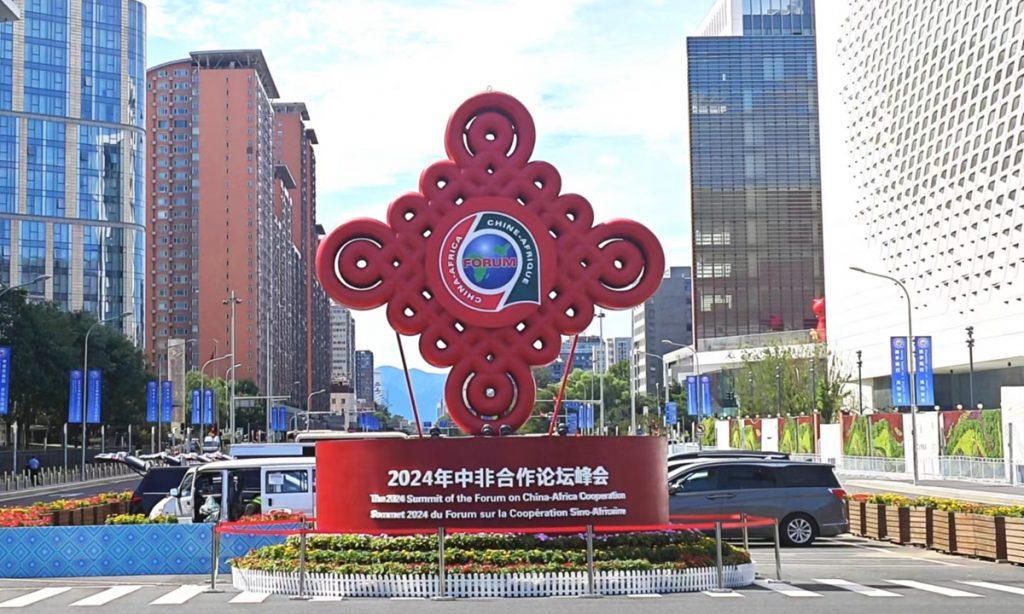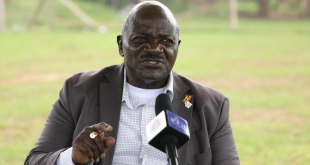By Xie

A decoration for the 2024 Summit of Forum on China-Africa Cooperation (FOCAC) is seen on display near the China National Convention Center in Beijing on September 6, 2024. This year’s FOCAC was held in Beijing from September 4 to 6. Photo: Yin Yeping/GT
Editor’s Note:
Starting from December 1, 2024, China will provide zero-tariff treatment for 100 percent of tariff lines to all least developed countries with established diplomatic relations, including 33 African nations. This makes China the first major developing country and major economy to implement such a significant measure. The move has been hailed as a demonstration of enhanced cooperation between China and Africa. In recent years, this cooperation has undergone substantial expansion, focusing on areas such as social development, digital economy, and environmental protection. China has played a crucial role in helping many African countries address food security issues, bridge the digital divide, and strive for green, low-carbon, and sustainable development. At the 2024 Summit of the Forum on China-Africa Cooperation (FOCAC), both sides further deepened their collaboration on global issues. As the continent faces numerous challenges, including economic difficulties and the adverse impact of climate change, cooperation with Africa is vital from a humanitarian perspective. How does China’s cooperation with Africa contribute to the continent’s humanitarian efforts? How is this cooperation perceived by African people?
The Global Times reporter Xie Wenting (GT) talked to Patrick Youssef (Youssef), regional director for Africa at the International Committee of the Red Cross (ICRC), on those topics and more.
Patrick Youssef, regional director for Africa at the International Committee of the Red Cross Photo Courtesy of Chris Whiteoak-The National
GT: You have been operating in Africa for many years. How do you assess the current cooperation between China and the International Committee of the Red Cross in Africa and China’s humanitarian efforts in the continent?
Youssef: I believe that global cooperation is, as always, a work in progress. It is very promising to see China actively supporting Africa. China has been a significant contributor of humanitarian assistance to the continent. For example, during the COVID-19 pandemic, China provided Africa with vaccines, medical supplies, and other essential medical items. We have met several times with Chinese medical teams that have been working abroad for the past 61 years, assisting African countries. We are developing a common understanding of the priorities we need to tackle together.
My hope is to work closely with our Chinese counterparts in many African countries where we operate. For instance, in 2009, I spoke with Chinese enterprises and companies in the east of Chad. Today, I am very pleased to have signed a Memorandum of Understanding (MoU) with the Alliance of Chinese Businesses in Africa for social responsibility.
I hope this will create a growing space for our future collaboration. This MoU was recently signed, and the future will reveal how Chinese enterprises, whether in the health sector, food security, or climate change issues, can indeed assist their African counterparts. Additionally, there may be opportunities to collaborate with the ICRC to create alliances or projects that could genuinely benefit the victims of armed conflicts.
GT: What are your major objectives during your visit to China this time?
Youssef: The main objectives of engaging with China as a high contracting party of the Geneva Conventions include collaborating with China’s Ministry of Foreign Affairs and meeting with partners. I had the pleasure of giving a lecture at the China Foreign Affairs University, where I shared our concerns and observations regarding the humanitarian situation in Africa.
It is crucial to shed light on the very difficult circumstances in many African countries and regions. Africa is a vast continent with varying levels of human development, and some regions are experiencing the horrors of war. Therefore, it is important to highlight the humanitarian needs in these areas while also exploring opportunities for further collaboration to bring hope to local populations.
GT: How do African people view Chinese companies operating in Africa? What’s your take on some reports from Western media outlets that disparage Chinese companies operating in the continent?
Youssef: There are not only Chinese companies that are involved; there are many companies in the world that come in and execute contracts in Africa. That is one aspect. If they can bring their expertise to the forefront, especially for populations living through the horrors of war, whether with the ICRC or without it, that is what matters. What we care about is that these communities become active participants, not just that they work with the ICRC. If they can achieve that elsewhere, then it’s great. Proper mechanisms need to be established in a given country to facilitate this. I see this in a very positive light, particularly when I think of the many African communities in need. Most African communities do not differentiate who comes to help; they are very open to support. This is a land rich in history and culture, and it is also a place where people recognize and appreciate assistance.
People want to live with dignity. When you tell them, “These are the tools and the seeds, and this is your land; just work your land,” it doesn’t matter where the support comes from, as long as it helps them reap the benefits. This allows them to start feeling like active citizens of their communities rather than just beggars or beneficiaries of humanitarian action.
The collaboration with Chinese companies could support our organizational structure, particularly in logistics, where Chinese companies could assist with cold chain solutions for medical goods. Additionally, we can consider operational collaboration, as seen in places like Vietnam, Ghana, and the Comoros, where China has successfully implemented farming initiatives that yielded positive results.
GT: What’s your interpretation of the Global Security Initiative and its significance for the world?
Youssef: There are many wars in the world, and in these conflicts, people face numerous security problems. I believe the message behind the Global Security Initiative is very important. Humanity suffers when there is war; the entire world cannot endure the consequences of conflict and its impact.
This initiative is crucial when we consider peace and development efforts, as it conveys a strong message. We are deeply moved by initiatives like this because they ultimately aim to minimize civilian harm, reduce the impact of war, and maximize support and assistance. Essentially, the concept of solidarity, which is frequently mentioned in the Belt and Road Initiative, is a key aspect of this effort.
I think the FOCAC is exactly the translation of the concept of solidarity into actual deeds and works on the ground. Therefore, I think it is important to emphasize the significance of such initiatives, particularly in areas experiencing the horrors of war and extreme violence.
GT: Development is an important topic, especially in today’s world, which faces multiple challenges. What is your interpretation of the Global Development Initiative and the emphasis it places on development?
Youssef: I would like to reiterate that it is very commendable, and I want to emphasize that the question of development in conflict settings is as important as ever. In protracted crises, we can bring hope while also reinforcing systems that can significantly impact the road to peace and contribute to greater stability.
The development of people, communities, and societies is what we truly need to pursue. I can tell you that the number of people living today in areas controlled by non-state groups is increasing rapidly. If development is to be equitably distributed, we must also consider those who are often overlooked.
GT: China has undergone a strenuous journey to eradicate poverty and embrace development. From your perspective, what lessons can African countries learn from China’s path to modernization?
Youssef: A lot of discipline and perseverance are required. The lesson here is that there is always a bright future when there is political will and support to alleviate people’s suffering. China is a great example of this. While there are other countries in the world that can share their lessons, China stands out particularly because of its development. I am referring specifically to human development – not just the construction of roads or the electrification of cars, which are certainly positive developments, but we are still not at that level in many parts of our African continent.
Hence, I believe the best lesson is truly perseverance and hope. It is through concrete actions, such as summits like FOCAC, that we can bring hope to the populations we serve. You can sense from what I’m saying that we are in a low state; we are not even discussing prosperity yet, but rather hope. There are people who are going to sleep tonight without food in many parts of Africa. This shows that the needs are sometimes immense. Additionally, the spread of violence is, unfortunately, a significant barrier to any human and social development. This is not just a theoretical observation; it is a harsh reality. Therefore, I sincerely hope that FOCAC continues to address these critical issues. The summits, as well as bilateral discussions and dialogues at international meetings including the G20 and the UN Security Council, must consider every human aspect. Every facet of our humanity should be viewed as a means to support those victims and help them escape their fragility.
globaltimes.cn
 Africa -China Review Africa -China Cooperation and Transformation
Africa -China Review Africa -China Cooperation and Transformation
